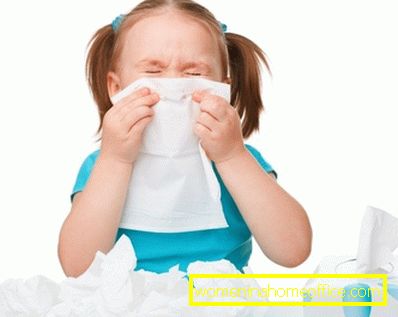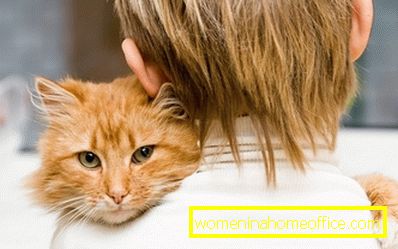Dry allergic cough in a child
If the child begins to cough, then the first thing that comes to mind of parents is a cold, acute respiratory infections or bronchitis. But sometimes these diseases have nothing to do with it: allergens are to blame for everything. The main thing that will help recognize the allergic cough in a child - the symptoms. Let's talk about its features, treatment and prevention.
Cough without temperature and snot: how serious is it?

When the child coughs and the pediatrician diagnoses “allergy,” many moms and dads sigh with relief. After all, this is not pneumonia, not bronchitis and not an infection! However, allergic reactions, including cough, can be fraught with dangerous consequences. If you do not take therapeutic measures, the condition will steadily worsen, and the saddest thing is that it can result in asthma.
The number of children with allergies is constantly growing. Most often, this problem is identified in the age group from 1.5 to 7 years. In many babies, red spots on the cheeks can be seen - diathesis. In the future, they may have an allergic cough. And if there are people in the family who suffer from allergies, the risk that the child will have such a disease in the first years of life reaches 60-70%.
It is rather difficult to cure allergic cough, because it is not enough just to drink antiallergic drugs. It is necessary to establish the culprit and completely eliminate the contact of the child with this substance, which is not always possible.
Where look for the root of evil?
But what makes a child suffer from coughing? It causes invasion of alien agents. These can be products (citruses, soybeans, cow's milk, eggs, etc.), natural substances (plant pollen, wool or feathers of pets, dust, mold spores). Protein, which is usually an allergic cough provocateur, can end up in the child’s body along with the vaccine.
Frequent infectious diseases, the use of products with chemical additives, medication, passive smoking can contribute to the appearance of such a symptom.
If an allergic cough in a child is disturbed at night, this indicates that the sensitizer is located next to it: an old pillow, dusty curtains, etc. Or maybe the powder used for bed linen is to blame.
Symptoms, which can be suspected allergies

If the cough is a response to the action of the allergen, then it appears suddenly and by itself, that is, there is no cold, the throat and head do not hurt, the temperature does not rise. As a rule, this is an unproductive cough (sputum does not move). It lasts for hours, torments a child for 2-3 weeks and gets worse at night. Before the attack, the child suffocates. Although the cough, as already mentioned, is usually dry, a small amount of clear mucus without impurities can be rarely released.
In this condition, the bronchial mucosa swells, so the child has difficulty breathing, he may have shortness of breath. There is itching in the nose.
how diagnosed?
Although there are specific symptoms of allergic cough in children, treatment can only begin after a thorough diagnosis. Today, many methods are used to detect the allergen. But first you need to establish that cough is associated with sensitization. To do this, pass a complete blood count. If the number of eosinophils exceeds 5 or the immunoglobulin E is increased, this will be proof of allergy.
The doctor will take a swab from a small patient for analysis - eosinophils can also be detected in it. The same cells in allergies are present in the sputum.
Conducted a bucky sputum examination. To determine the type of allergen, enzyme-linked immunosorbent assay and blood test method MAST.
If the child is more than 3 years old, you can make him an allergy test. This examination looks like this: a nurse will make small scratches on the child's skin with a sterile scarifier, then various allergens will be applied to these places. According to the reaction of the organism, they will conclude which substance is sensitizing.
how recognize cough: recommendations Komarovsky
Many parents are interested in what advice the Komarovsky child gives about allergic cough. In his opinion, in 90% of cases it still has an infectious nature or is associated with somatic diseases. The “Teledoctor” warns parents: it’s not worth guessing what caused such a symptom - it’s better to know about this from a doctor. But the mother must inform the pediatrician that the child had contact with something unusual (the day before the barbecue was fried, and the child “inhaled” the smoke, collected bouquets of flowers, or was covered with a woolen blanket).
What kind drugs will make you forget about allergic cough?

In order for the child to stop coughing, it is enough to remove the irritant: replace the duvets and pillows with synthetic padding, do not keep pets, and often carry out wet cleaning. But how to eliminate such an allergen like flowering trees? ..
Typically, drug therapy includes the following medications:
- antihistamines - Suprastin, Tavegil (not suitable for children younger than a year), Claritin, Zyrtec, Dimedrol, Fenistil;
- bronchodilators - Salbutamol, Eufillin;
- thinning sputum - Bromhexin, Lasolvan;
- mast cell strengthening membranes - Cromolin, Ketotifen;
- cleansing the digestive tract from toxins - Smekta, Atoxyl;
- in severe cases - Dexamethasone, Becotide, Prednisolone.
Today, it is possible to cure a dry allergic cough in a child with the help of allergen-specific immunotherapy, in which an irritant causing a cough is injected into the child’s body in small doses. The dose gradually increases. This treatment takes about 2 years.
It is useful to make inhalation of bronchospasm removers using a nebulizer.
Folk treatment
What does an alternative medicine offer to treat allergic cough in a child? To alleviate his condition at home, you can:
- daily rinse the mouth and rinse the nasopharynx with warm water (you can put in it a little sea salt);
- this remedy will help to remove the coughing attack: boil 10 bay leaves for 5 min., add to the decoction 1 tbsp. l honey and soda. When the cough begins, take 50 ml of this remedy. Warning: it is only suitable for children who are not allergic to its ingredients;
- garlic syrup helps to stop coughing. Cooking is simple: chop 5 cloves of garlic, sprinkle them with sugar. Leave for 2 weeks. Consume with an attack of 1 tbsp. l .;
- a positive effect gives a lemon-honey mixture: 2 tbsp. l honey mixed with 1 crushed citrus, pour 4 tbsp. l boiled water, the mixture is boiled over low heat until a homogeneous consistency. It is given in a teaspoon of 3 r. per day or put in herbal tea.
what to keep a child from having an allergic cough?

To avoid such a nuisance with your baby, it is necessary to maintain cleanliness in his room and in the whole house or apartment. It is better to decorate the nursery with smooth wallpaper, because dust does not sit on them. It is necessary to periodically wash toys. And in order not to provoke sensitization, it is better not to give the baby allergenic products up to 3 years.
If a child has an "incomprehensible" cough, then you should not act by trial and error - give antihistamines and see if the symptom passes. After all, even an experienced doctor is hard to determine if an allergy or such dangerous diseases as bronchitis or whooping cough are to blame. Just imagine what will happen if you treat them with antiallergic drugs ...